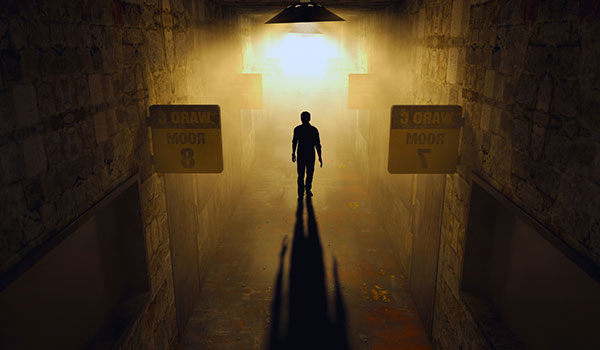
Hello, curious minds and compassionate hearts! If you’ve ever been fascinated by the mysteries of the mind or the history of mental health care, then you’ve stumbled upon a compelling topic. Many people widely believe the Bethlem Royal Hospital in London, England, commonly known as “Bedlam,” is the world’s oldest mental hospital. It was founded in 1247 as a priory for the Order of the New Bethlehem by Simon FitzMary, a sheriff of the City of London.
Over time, the institution evolved into a hospital for the mentally ill. However, the hospital faced numerous challenges throughout its history, including overcrowding, mistreatment of patients, and a notorious reputation for its poor conditions. Books that explore mental hospitals provide insights into the experiences of people with mental health challenges and the unique environments and complexities of mental health institutions.
Reading about characters in mental hospitals allows you to step into their shoes and gain a deeper understanding of their thoughts, emotions, and struggles. It can foster empathy and help you develop a more compassionate perspective towards those dealing with mental health issues. The set in mental hospitals sheds light on the history, practices, and treatment methods employed in mental health institutions. This historical context can highlight the progress made in mental healthcare and the areas where improvements are needed.
We’re delving into the world of Books that are about Mental Hospitals, exploring the corridors of institutions that have both haunted and healed. These narratives, ranging from personal memoirs to historical analyses, offer a window into the evolving landscape of mental health treatment, the human stories within these walls, and the societal attitudes towards mental illness. So, if you’re ready for a journey that’s as enlightening as it is emotional, join us as we uncover the stories of resilience, reform, and revelation that these books have to offer.
10 Books About Mental Hospitals (Psychiatric Hospitals/Asylums)
Books set in mental hospitals explore the dynamics within these institutions, such as power structures, treatment methods, and the experiences of patients and staff. They highlight both progress and areas in need of improvement.
I will talk about ten books about mental hospitals or asylums. These books aim to challenge the stigma and misconceptions surrounding mental health. Also, they encourage you to question preconceived ideas and foster empathy and compassion. Let’s go!
1. One Flew Over the Cuckoo’s Nest by Ken Kesey
One Flew Over the Cuckoo’s Nest is a classic novel published in 1962 that significantly impacted literature and popular culture. The story takes place in a mental hospital and follows the experiences of both patients and staff as it delves into themes of sanity, freedom, power, and rebellion.
Chief Bromden, a patient who feigns deafness and muteness, narrates the novel to offer an intimate look at the oppressive environment of the ward. The arrival of the charismatic and rebellious Randle McMurphy, who feigns insanity to escape prison work, disrupts the rigid order established by the head nurse of the ward (Ratched).
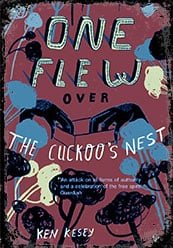
The novel focuses on the question of what it truly means to be sane and raises concerns about the role of institutions in determining and controlling the mental health of individuals. It explores the power dynamics between patients and authority figures, shedding light on the abuse of power and the dehumanization that can occur within institutional settings.
McMurphy challenges the authority and control exerted by Nurse Ratched, sparking a power struggle that escalates throughout the narrative. Kesey’s writing style immerses you in the mental hospital setting, capturing the suffocating atmosphere, the dehumanizing treatment of patients, and their struggles asserting their individuality. Through the character of McMurphy, Kesey highlights the importance of personal freedom and the rebellion against oppressive systems.
2. Girl, Interrupted by Susanna Kaysen
Girl, Interrupted is a memoir by Susanna Kaysen, published in 1993. It provides a deeply personal and introspective story of her experiences in a mental hospital in the 1960s. Kaysen’s memoir offers a poignant exploration of mental illness, the complexities of identity, and the impact of societal norms on individual well-being.
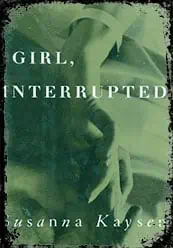
The book begins with Kaysen reflecting on her diagnosis of borderline personality disorder at the age of eighteen and her subsequent voluntary admission to McLean Hospital in Massachusetts. She describes the institutionalized environment and introduces readers to the other women she meets during her stay. Through her interactions with these fellow patients, Kaysen focuses on their varied backgrounds, struggles, and the shared sense of camaraderie that develops among them.
Kaysen’s writing style is raw, honest, and reflective, allowing us to understand her thoughts, emotions, and challenges as she grapples with her mental health. She shows the complexities of her diagnosis, exploring the nuances of borderline personality disorder and questioning the societal expectations and gender roles that contribute to her experiences.
As she shares her experiences within the hospital, she raises questions about the nature of sanity, the subjectivity of mental health diagnoses, and the impact of institutionalization on personal identity. She challenges the reader to consider the fine line between “normal” and “abnormal” behavior and prompts a reevaluation of society’s understanding of mental illness. The book sheds light on the vulnerabilities, resilience, and personal growth that can occur in such environments, as well as the flaws and limitations of the mental health system.
3. The Bell Jar by Sylvia Plath
The Bell Jar is a semi-autobiographical historical novel published in 1963. It explores themes of mental illness, identity, and the societal pressures imposed on women in the 1950s. The story follows a talented and ambitious young woman (Esther Greenwood) who wins an internship at a prestigious fashion magazine in New York City.
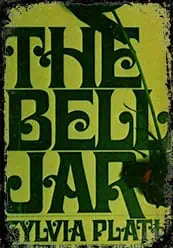
However, Esther faces the glamorous and competitive world of 1950s society. She begins to feel increasingly disillusioned and trapped. The pressures to conform to societal expectations and her internal struggles contribute to her gradual breakdown.
Plath’s writing style is poetic, capturing the intensity of Esther’s emotions and the disorienting nature of her mental decline. The novel takes you on a deeply personal journey as Esther’s depression deepens, and she experiences a sense of detachment and isolation from the world around her.
She is eventually placed in a psychiatric hospital, undergoing various treatments and meeting other patients who provide glimpses into their struggles. Plath explores the dehumanizing aspects of institutionalization and the complexities of mental health care during that time.
4. It’s Kind of a Funny Story by Ned Vizzini
”It’s Kind of a Funny Story” is a young adult fiction published in 2006 that focuses on the experiences of a teenager struggling with depression and his voluntary admission to a psychiatric hospital. We follow Craig Gilner, a high-achieving high school student overwhelmed by academic pressure and the expectations placed upon him. Struggling with depression and suicidal thoughts, Craig checks himself into a psychiatric hospital, seeking a way to cope with his emotional turmoil.
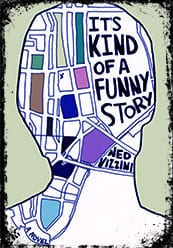
Vizzini’s writing style captures the teenage voice authentically, infusing the narrative with humor, wit, and introspection. Through Craig’s perspective, you gain insight into his inner thoughts, fears, and challenges in the psychiatric ward. Within the hospital, Craig forms unexpected friendships with other patients, each with unique stories and struggles.
These relationships offer support, empathy, and moments of genuine connection, highlighting the importance of human connection in the healing process. The novel encourages open conversations about mental illness, highlights the importance of seeking help, and reminds readers that support and connection are vital components of the healing journey.
5. The Hospital by Ahmed Bouanani
The Hospital is a Moroccan literature written in French and published in 1990. This poetic and surreal work uniquely explores life within a mental institution. The novel presents an unnamed narrator who finds himself in an eerie and abstract mental hospital-like setting.
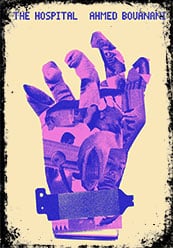
The hospital becomes a metaphorical space where the boundaries between reality and imagination blur, and identity becomes fluid. Bouanani focuses on the narrator’s and other patients’ psychological depths through poetic prose, examining their internal struggles, desires, and fragmented memories.
The novel’s fragmented structure mirrors the characters’ fragmented minds and fractured experiences, immersing readers in a world where the line between sanity and insanity is ambiguous.
The story covers confinement, power dynamics, and the search for meaning within an oppressive environment. It invites readers to question the nature of reality and the construction of personal identity. Moreover, it’s a challenging yet rewarding literary experience that explores the intricacies of the human psyche, the nature of confinement, and the boundaries of perception.
6. The Center Cannot Hold: My Journey Through Madness by Elyn R. Saks
The Center Cannot Hold is a non-fiction memoir published in 2007. This deeply personal and candid story offers a powerful glimpse into the lived experience of living with schizophrenia and the challenges faced within the mental health system. Saks shares her journey from her early childhood, marked by the first signs of mental illness, to her eventual diagnosis of schizophrenia as a law student at Yale University.
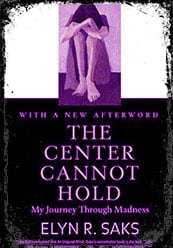
The memoir takes us through her struggles with hallucinations, delusions, and the impact of medication on her mental state. She also discusses her experiences within psychiatric hospitals, highlighting the mental health system’s positive and negative aspects.
The book serves as an important voice in destigmatizing mental illness, challenging misconceptions, and advocating for greater understanding and support. The memoir examines broader societal issues surrounding mental health, including the limitations of the mental health system, the need for improved access to care, and the importance of destigmatization.
7. Behind the Gates of Gomorrah: A Year with the Criminally Insane by Stephen Seager
Behind the Gates of Gomorrah is a non-fiction memoir that offers an inside look into the author’s experiences working as a psychiatrist in a high-security psychiatric hospital. The book focuses on the author’s time at the Napa State Hospital in California. The hospital is known for housing individuals who have been deemed not guilty because of insanity for committing various crimes.
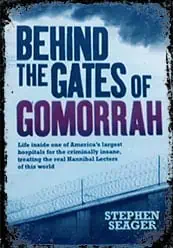
Stephen Seager, a forensic psychiatrist, provides a candid and thought-provoking narrative that shows the lives of criminally insane patients. Through his observations and interactions, he examines the challenges and complexities of treating everyone with severe mental illnesses with a criminal history.
The book sheds light on the inner workings of the hospital, the ethical dilemmas faced by the staff, and the struggles and vulnerabilities of the patients. Seager also explores the broader societal issues surrounding mental illness, the criminal justice system, and the challenges of providing adequate mental health care for this population.
8. The Psychopath Test: A Journey Through the Madness Industry by Jon Ronson
The Psychopath Test is a non-fiction book that explores the concept of psychopathy and focuses on the world of mental health diagnosis and treatment. Author Jon Ronson is a British journalist who takes readers on a captivating and humorous journey by investigating the concept of psychopathy and its implications. He explores the Diagnostic and Statistical Manual of Mental Disorders (DSM) and its criteria for diagnosing psychopathy, as well as the influence of this diagnosis in various fields such as psychiatry, psychology, and the criminal justice system.
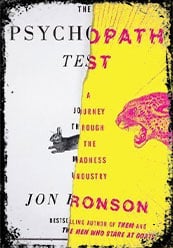
Throughout the book, you meet with experts in the field of psychology, interview those diagnosed as psychopaths, and even infiltrate a secretive group known as the Hare Psychopathy Checklist, which is involved in the identification and study of psychopathy.
The story examines the ethical questions surrounding the diagnosis and treatment of psychopathy, the potential misuse of psychiatric labels, and the social and cultural implications of defining individuals as “psychopaths.” Ronson also discusses the connection between psychopathy and successful people in business and politics, questioning the role of psychopathic traits in society.
9. Gracefully Insane: Life and Death Inside America’s Premier Mental Hospital by Alex Beam
Gracefully Insane is a non-fiction book that explores McLean Hospital in-depth. This is a renowned psychiatric institution located near Boston, Massachusetts. Alex Beam represents the rich history of McLean Hospital, tracing its origins back to the 19th century. The book explores the evolution of mental health treatment and the changing societal attitudes toward mental illness throughout the years.
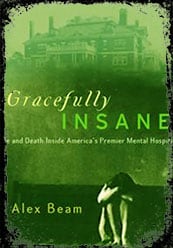
This informative book provides historical research, interviews, and personal anecdotes to shed light on the lives of both patients and staff within McLean Hospital. It explores the daily routines and treatment methods used within the hospital and shows the controversies and scandals over the years.
The author examines patients’ experiences at the institution, including renowned poet Robert Lowell and famous actress Sylvia Plath. He tackles issues such as the rise and fall of lobotomy as a psychiatric treatment, the ethical dilemmas faced by the medical staff, and the impact of changing healthcare policies on psychiatric institutions.
10. Madness: A Bipolar Life by Marya Hornbacher
Madness is a memoir of Marya Hornbacher, who shares her personal experiences living with bipolar disorder. The book provides a firsthand story of the author’s struggles and triumphs. She takes us through her journey of being misdiagnosed, going through numerous hospitalizations, and grappling with the highs and lows of bipolar disorder. Her memoir offers an honest portrayal of living with bipolar disorder, shedding light on its impact on various aspects of her life, including relationships, work, and self-perception.
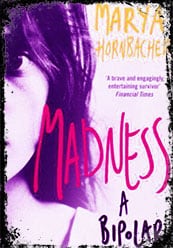
This book can be both informative and relatable for those who have personal experience with bipolar disorder, as well as those who want to learn more about mental health hospitals and the human experience. However, it represents Marya Hornbacher’s personal experience and may not fully capture the diversity of experiences within the bipolar community. If you or someone you know is seeking information or support related to bipolar disorder, consult with mental health professionals or reliable sources for a comprehensive understanding.
Old documentary about mental hospital
Numerous documentaries have been made about mental hospitals and psychiatric institutions over the years. Here are some examples of older documentaries on this topic:

Titicut Follies (1967): This groundbreaking documentary, directed by Frederick Wiseman, offers a stark and unflinching look at the Bridgewater State Hospital for the criminally insane in Massachusetts. The film reveals the institution’s harsh conditions, questionable treatment methods, and dehumanizing aspects.
The Massachusetts Supreme Judicial Court ruled that the film violated the patient’s privacy rights and was removed from public circulation for 24 years. After a legal battle in 1991, authorities lifted the ban, making the film available for public viewing. “Titicut Follies” is now considered an essential documentary in mental health and has raised awareness about treating mentally ill people within institutional settings.
Asylum (1972) by Peter Robinson: This documentary takes viewers inside the State Mental Hospital in Ypsilanti, Michigan. It provides an intimate portrayal of the lives of patients and staff, exploring the struggles, hopes, and challenges within the mental health system of the time.
Bedlam (1946) by Mark Robson: This film is fictionalized but draws inspiration from the documentary footage shot inside mental institutions. It offers a critical examination of the inhumane treatment of patients and the overcrowded conditions within psychiatric hospitals.
Crazywise (2017): This documentary explores traditional wisdom and alternative approaches to mental health challenges. It challenges the conventional understanding of mental illness and discusses such experiences’ transformative potential.
The portrayal of mental hospitals in older documentaries may not reflect the current state of mental health care or the advancements in treatment and understanding of mental health. Mental health practices and approaches have evolved significantly over the years, and it’s essential to consider the context and historical perspective while watching older documentaries.
5 Fiction Books About Psychiatric Hospitals
- “One Flew Over the Cuckoo’s Nest” by Ken Kesey
This classic novel is set in a mental institution and narrated by Chief Bromden, a long-term patient who pretends to be deaf and mute. The story is centered around Randle Patrick McMurphy, a new patient who challenges the oppressive rules imposed by Nurse Ratched. Kesey’s book is a critique of the dehumanization and control practices in mental health institutions and a call for freedom and individuality.
- “Girl, Interrupted” by Susanna Kaysen
Based on the author’s own experiences, “Girl, Interrupted” is a memoir that reads like fiction, offering a poignant glimpse into life inside a psychiatric hospital in the 1960s. Kaysen provides a series of vignettes that explore the boundaries between sanity and insanity, the nature of diagnosis, and the experience of being a young woman labeled as mentally ill.
- “It’s Kind of a Funny Story” by Ned Vizzini
This contemporary novel follows Craig Gilner, a high-achieving teenager who checks himself into a psychiatric hospital due to overwhelming depression and suicidal thoughts. Vizzini, who himself struggled with depression, writes with authenticity and humor, offering a hopeful perspective on mental illness, treatment, and the possibility of recovery.
- “The Bell Jar” by Sylvia Plath
Sylvia Plath’s semi-autobiographical novel chronicles the mental breakdown of Esther Greenwood, a young woman who finds herself in a psychiatric hospital after experiencing severe depression. Plath’s exploration of Esther’s struggle is a profound and personal account of the search for identity amidst the pressures of society and the shadow of mental illness.
- “Shutter Island” by Dennis Lehane
Set in 1954, “Shutter Island” follows U.S. Marshal Teddy Daniels as he investigates the disappearance of a patient from Ashecliffe Hospital for the Criminally Insane. The novel delves into the dark and complex nature of the human mind, with a twisting plot that keeps readers guessing until the very end. Lehane’s portrayal of psychiatric treatment in the mid-20th century and the use of the hospital setting amplify the book’s eerie and suspenseful atmosphere.
Asylum Romance Books
If you’re looking for romance books with a setting in an asylum or mental health institution, then approach the topic with sensitivity and awareness of the potential stigma surrounding mental health.
While such settings can provide a unique backdrop for storytelling, it’s crucial to prioritize accurate and respectful portrayals of mental health and experiences. Here are a few romance books that explore relationships involving characters in mental health or institutional settings:
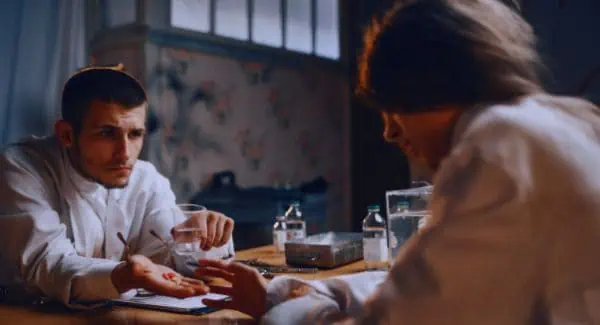
Made You Up by Francesca Zappia: This young adult novel follows the story of a high school student (Alex) with schizophrenia. While not set in an asylum, the book shows Alex’s experiences and includes a romantic subplot.
Loving Mr. Daniels by Brittainy C. Cherry: This novel is primarily a romance. It includes a subplot involving a character dealing with mental health challenges. The story represents a forbidden love affair between a young woman and her college professor.
The Boy Who Couldn’t Die by William Sleator: This young adult novel features a teenage boy named Ken who is in a psychiatric institution after surviving a series of near-death experiences. Amidst the institution’s challenges, Ken connects with a fellow patient.
The Asylum for Wayward Victorian Girls by Emilie Autumn: This novel blends historical fiction with horror and fantasy. It follows the story of Emilie, a modern-day girl trapped in a Victorian-era insane asylum. The story explores mental health and includes romantic elements with a dark and macabre atmosphere.
We hope this journey has opened your eyes to the complexities of mental health care, the progress and pitfalls of psychiatric institutions, and the indomitable spirit of those who have navigated their halls. Each book we’ve shared offers a unique lens through which to view the challenges, triumphs, and ongoing conversation around mental health and societal responsibility.
As you move forward, may the stories and insights you’ve gathered inspire you to approach mental health with greater empathy, curiosity, and advocacy. Until we meet again in the pages of another deeply human story, keep exploring, keep questioning, and may your reading adventures continue to broaden your understanding and compassion for all walks of life. Happy reading, and may your journey through literature be as enriching as it is enlightening.
Read More:
Table of Contents
